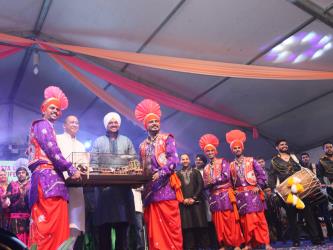Vaisakhi

Vaisakhi, also spelled Baisakhi, is a significant and vibrant festival
celebrated in the Indian subcontinent, particularly by the Sikh community. It
holds great cultural, religious, and historical importance.
Vaisakhi marks the beginning of the new solar year and the harvest season in the
region. It's a time of joy and celebration as people express gratitude for a
good harvest and pray for future prosperity.
For Sikhs, Vaisakhi holds immense religious significance. It commemorates the
formation of Khalsa (the pure), a community of initiated Sikhs, by Guru Gobind
Singh, the tenth Guru of Sikhism, in 1699. During a special ceremony on Vaisakhi,
Guru Gobind Singh baptized the Panj Pyare (the Five Beloved Ones) and
established the core principles of Sikhism.
In 1699, Guru Gobind Singh called Sikhs from all over to the city of Anandpur
Sahib. During a congregation, he asked for volunteers willing to sacrifice their
lives. Five brave individuals, the Panj Pyare, stepped forward, offering their
heads. Guru Gobind Singh initiated them into the Khalsa, a warrior community
dedicated to upholding righteousness, justice, and equality. This event
transformed the Sikh community and solidified Sikh identity.
Vaisakhi celebrations include various events like processions, kirtan (singing
of hymns), langar (community meal), and nagar kirtan (street procession). Sikhs
visit gurdwaras (Sikh temples) to offer prayers and seek blessings. Colorful and
lively processions are organized, showcasing traditional Sikh martial arts,
music, and hymns.
Additionally, people prepare and enjoy traditional Punjabi dishes, engage in
folk dances like Bhangra and Giddha, and partake in community festivities.
Vaisakhi is celebrated with enthusiasm and fervor by the Sikh community in
Malaysia. Malaysia is home to a significant Sikh population, and Vaisakhi holds
great religious and cultural importance for them.
undo Malaysian Festivals